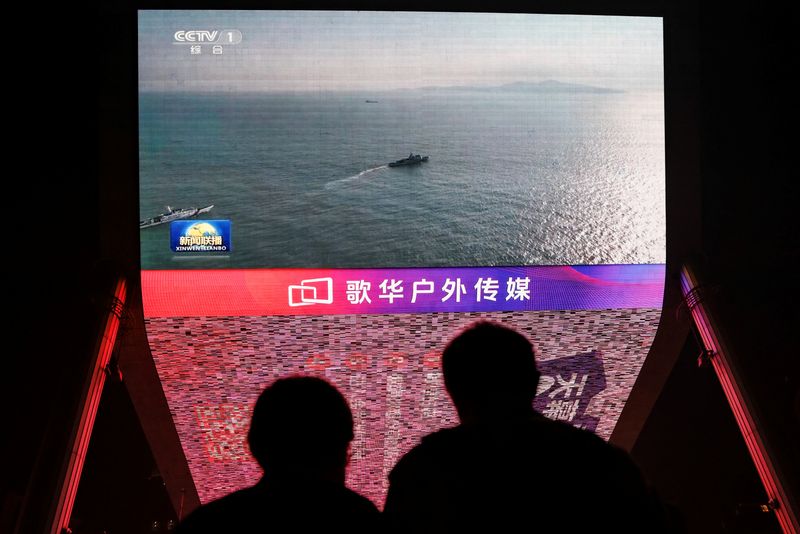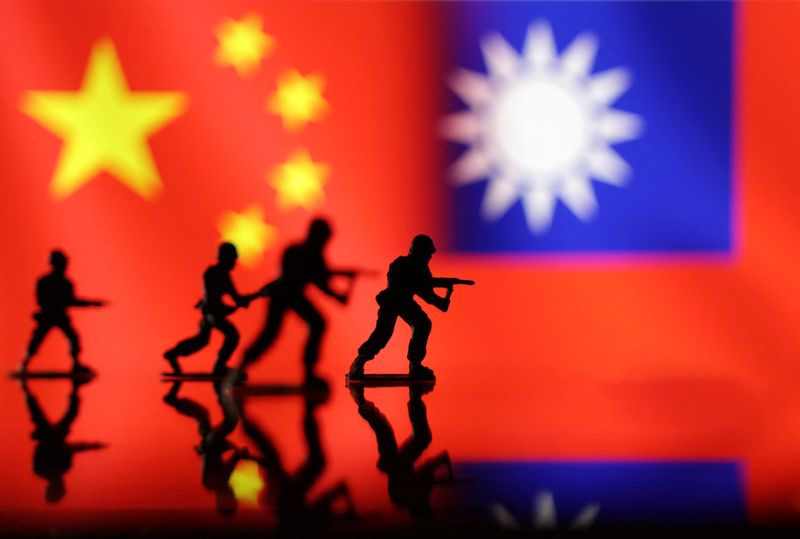By Yimou Lee and Ben Blanchard
TAIPEI (Reuters) -China is likely to launch military drills in the coming days near Taiwan, using President Lai Ching-te's upcoming trip to the Pacific and scheduled U.S. transit as a pretext, according to assessments by Taiwan and regional security officials.
Lai will start a visit to Taipei's three diplomatic allies in the Pacific on Saturday, and sources told Reuters he was planning stops in Hawaii and the U.S. territory of Guam in a sensitive trip coming shortly after the U.S. election.
China, which views democratically governed Taiwan as its own territory and the most important issue in its relations with Washington, has a strong dislike of Lai whom Beijing calls a "separatist".
Lai's office has yet to confirm details of what are officially stop-overs in the United States, but is expected to do so shortly before he departs, sources familiar with the trip have previously said.
Beijing could conduct military manoeuvres around or shortly after Lai's trip which ends on Dec. 6, said four officials in the region briefed on the matter, who declined to be identified due to the sensitivity of the topic.
China's defence ministry did not respond to a request for comment, though the government has urged the United States not to permit Lai to transit.
Chen Binhua, spokesperson for China's Taiwan Affairs Office, said on Wednesday that Lai's transit stops were "essentially provocative acts that violate the one-China principle".
Taiwan's presidential office said in a statement that if China were to use Lai's trip as an excuse to launch military exercises, "it would be a blatant provocation of the status quo of peace and stability in the region".
Taiwan's defence ministry said in a separate statement any deliberate attempt to create tension in the Taiwan Strait would undermine peace and stability, which is not "the proper behaviour of a responsible modern country".
The White House did not respond to a request for comment.
China has already staged two rounds of major exercises around Taiwan this year to pressure Taipei, one in May and one in October, dubbed "Joint Sword - 2024A" and B, respectively.
China could "repackage" ongoing regular military activities in the South China Sea or the East China Sea, moving them closer to Taiwan and rebranding them "Joint Sword - 2024C," according to a Taiwan security official.
Beijing could expand the size of its regular "joint combat readiness patrol" that typically involves naval and air force drills near Taiwan during Lai's visit and launch a "targeted" exercise towards the end of the trip, the source said.
Between 20 and 30 Chinese naval vessels are involved in the ongoing military manoeuvres this week in the South China Sea, the source added.
'RED LINE'
Beijing wants to show the incoming U.S. administration of President-elect Donald Trump that the first island chain is "China's sphere of influence" and Lai's trip could become a "pretext", the official said, referring to an area that runs from Japan through Taiwan, the Philippines and on to Borneo, enclosing China's coastal seas.
"Beijing hopes to draw a red line and establish its power" during the U.S. government transition and extend its sphere of influence, the official said, adding the military drills were meant for the United States and its allies.
A second source, a Taiwan-based regional security official, said the drills would probably be more limited in scope than the two earlier rounds this year given unstable winter weather conditions in the Taiwan Strait.
A third source, familiar with security assessments around Taiwan, said China could use exercises in the coming weeks to test the bottom line of the Trump administration.
Two of the sources said more favourable weather conditions may prompt an earlier or delayed display of force in the days around Lai's trip.
Taiwan presidents typically take advantage of stop-overs in the United States going to and from far-flung allies to give speeches and meet with friendly politicians. Lai will be visiting the Marshall Islands, Tuvalu and Palau, three of the 12 remaining countries maintaining official diplomatic ties with Taipei.

It would not be unprecedented for China to respond militarily to this trip. It did so in August of last year when then-Vice President Lai returned from the United States, and in April of last year upon then-President Tsai Ing-wen's return from California.
Lai and his ruling Democratic Progressive Party reject Beijing's sovereignty claims, saying only Taiwan's people can decide their future.
